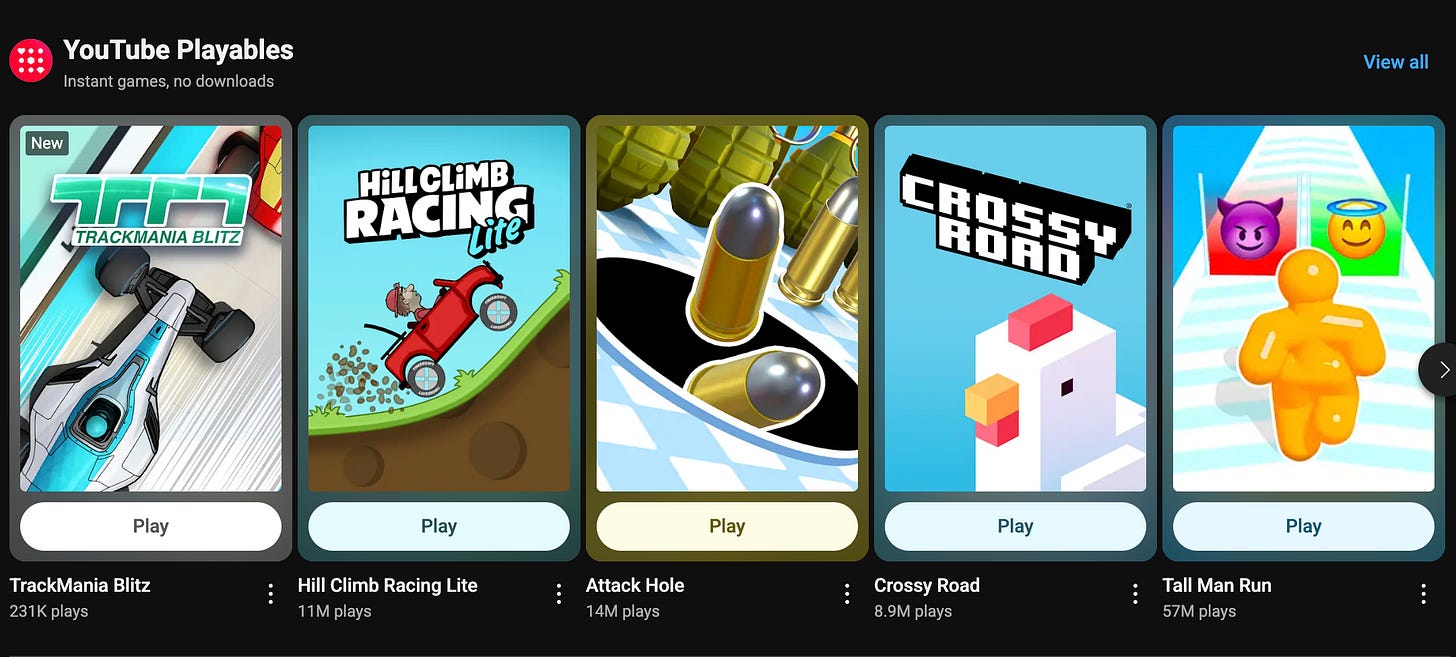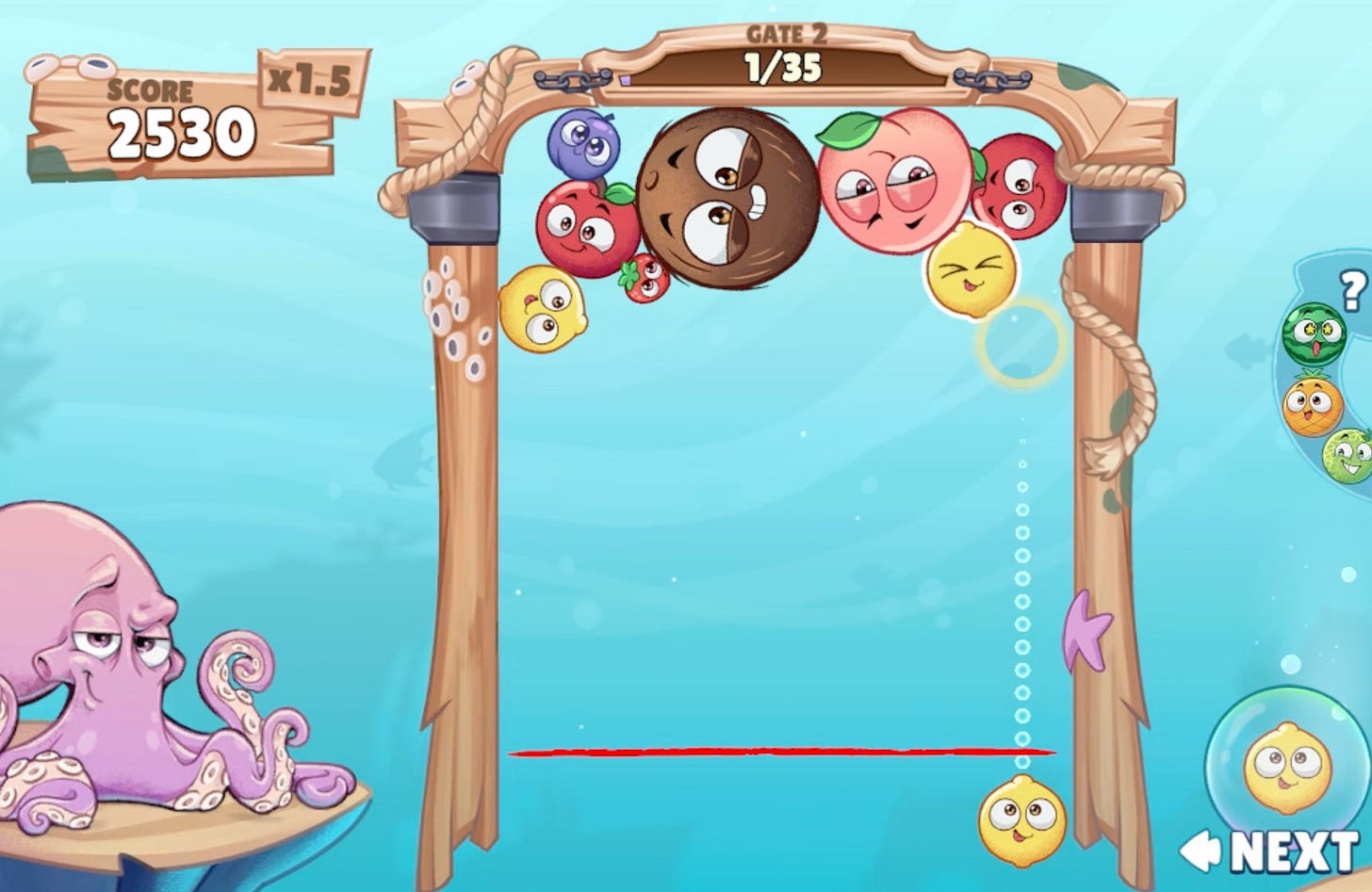Why does every website need a "games" section?
Does anyone play the Netflix games?
A few months ago, Reddit added a “Games on Reddit” section to its homepage that, with any luck, you haven’t even noticed. This is meant to look like something that has always been there — oh, you didn’t know that Reddit has games? But as far as I can tell, nothing on the r/GamesOnReddit sub is older than 6 months, when they rolled this out.1 If you want to play a really bad version of Flappy Bird, you can pop over to r/FlappyGoose and play it in the browser.
Alternatively, you can go to Netflix and play their ripoff of Suika Game, Underwatermelon Fruit Merge. It’s actually a kinda good modification of Suika Game, so much so that my friend was browsing Netflix recently and asked “who tf is playing games on Netflix?” and I had to embarassingly admit that it was me. And then I tried to show him Underwatermelon Fruit Merge, he politely indulged me, and we both immediately got bored. The Netflix games are basically unplayable when watching on a smart TV, since you’ll have to download their phone app to use as a controller (not tactile) and play with a tiny bit of lag that ruins any upside. On a computer, they range from very bad to only slightly bad.
When I was at Vox, they made a big deal of adding Cinematrix to Vulture, a blatant attempt at chasing the daily “-dle” games that make the NYT so much money. (For a much better version, try the poorly-named Cine2Nerdle.) There are also games on websites that are desperately seeking any foothold of relevance, like Merriam-Webster. Best of luck to Merriam-Webster, we love Merriam-Webster, don’t we folks.2
Ok but why
It’s not all that new to add cheap games to a site — this could be seen as the next stage of the “Buzzfeed quiz” era of the internet, where publishers made money off of low-budget slop and channeled that into, say, good journalism. It’s not much of a leap to look at that model and say Hey, let’s cut out that journalism part!
Of course, now there are only about 5 or 6 websites that anyone goes to at all. Facebook, the first of these “everything websites”, has had games since I was in highschool and we actually used Facebook, and now that feature is a tiny vestigial organ on your homepage. If I were a gambling man, I’d bet that X, The Everything App™, will soon follow suit. In the dwindling scramble to be one of the few remaining sites that people actually use, sites will fight to retain a tiny slice of “gamers” that actually use these poorly-implemented features. They don’t want to be a “website”, they want to be a “platform.”
Not many people seem to have covered this half-assed trend. In one article I did find, Bertel King wrote for How-To Geek (terrible name) about the various market factors that influence these decisions. The most relevant portion, to me, is that they’re spending barely anything on these products. It shows: almost every game on Netflix, Youtube, or Reddit is a ripoff of an existing arcade game, or is slightly above the level of quality that we saw on Newgrounds in 2007. The reason people keep returning to the NYT’s games is that they’re made with care, attention, and directly appeal to their audience.
Games don’t make money, nobody makes money
During my years of writing branded content, I was skeptical that anyone was getting their money’s worth. The idea that Coca-Cola could buy $500k worth of The Best Summer Barbecue Tips articles and then sell 501k more sodas seemed highly dubious to me. Eventually, I think, this ended up playing out as expected; in my last year of employment, Vox laid off half of the written content team at Vox Creative. Nobody reads articles anymore, they’re not even going to the websites where articles hang out.
To me, adding a poorly-constructed games interface to a website feels like the “pivot to video” era, albeit with less overinvestment. It’s a desperate ploy to get people to spend time on their actual website. Unlike say, Vulture spending money on videos that only get seen on Instagram, they actually need to be on Vulture to play the game.
What these attempts forget is that gaming being the largest media category by spending also leads to the largest contractions in the market. The consistent spending is funneled through mobile slop ads, microtransactions3 and, crucially, the AAA games and indie darlings made with attention to detail, love, and talent. You know, games actually worth spending money on. Given the proliferation of free slop on the ad store, it doesn’t seem worth it for Netflix or YouTube to compete on the bottom tier of content. To paraphrase our president: whatever, someone will keep drinking that shit.
“Play” my “game”
While I have you here, I published a quick “flat game” as my first school project. It’s a little look at how I spent my summer and takes all of a minute to play. Maybe you’ll enjoy it! Link below (runs on desktop browser only).
A fun aside: one of the top-rated posts there is “Why are you pushing these garbage features on us?”
Prescriptivists, here’s your chance to boo and hiss
If Reddit can figure out how to get people to spend money on a skin for Flappy Goose, more power to em. Shit, do I need to be making skins for Flappy Goose?





boo, hiss, I'm a M-W defender
I'm for games being used to fund good journalism, but to your point, most websites see it as a means-to-an-end rather than an actual product with value to properly produce. This half-assing makes it impossible for it to actually work as a revenue stream meant to fuel things like good journalism. The reason why the NYT games work is that they're actually good and worth playing. I mean, clearly people feel that way because so many people play them and it actually brings in a considerable amount of revenue for NYT. So, I understand your disdain for this stuff, but I think it's still a concept worth investing in. Because when it works, it really works.